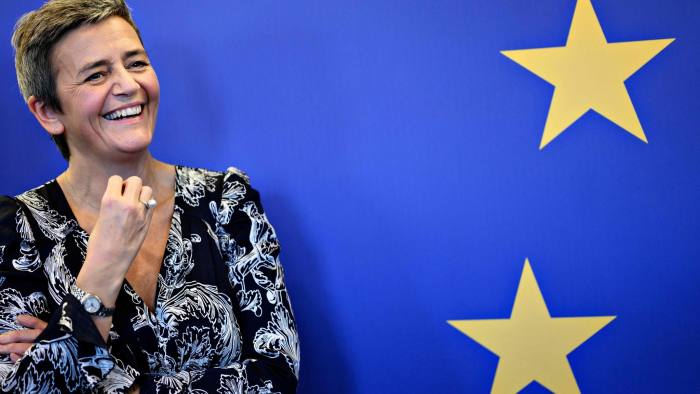
EU unveils €3bn research fund to develop batteries
Seven member states to invest in the project which is set to run until 2031
by Javier Espinoza, Guy ChazanThe EU has approved a €3.2bn fund to promote the research and development of batteries as it targets strategic areas in which to help European companies develop new technology to keep up with global competition.
Seven EU countries — Belgium, Finland, France, Germany, Italy, Poland and Sweden — will provide funding of up to €3.2bn for the project, set to be completed by 2031. The European Commission said it expected a further €5bn in private investment.
Announcing the initiative on Monday, Margrethe Vestager, executive vice-president in charge of promoting technology in Europe and the EU’s competition commissioner, said: “Battery production in Europe is of strategic interest for our economy and society because of its potential in terms of clean mobility and energy, job creation, sustainability and competitiveness.”
She added: “The approved aid will ensure that this important project can go ahead without unduly distorting competition.”
Maros Sefcovic, vice-president for interinstitutional relations and foresight, said: “Thanks to intensive efforts by seven member states, industry and the commission, Europe’s first major pan-European battery ecosystem is emerging, with lead projects in all segments of this strategic value chain.”
The plan will involve 17 direct participants, mostly industrial actors, including small and medium-sized businesses, the commission said. Representatives from the member states will monitor the project.
Peter Altmaier, Germany’s economic affairs minister, called it “a big success for Germany and Europe as a destination for investments in the auto industry”.
He added: “We want to produce the most innovative and sustainable batteries in Germany and Europe and so secure added value and jobs in Europe. That is why we are pursuing a comprehensive approach with our concept, from material to production to recycling. Now it’s up to us to get concrete projects off the ground.”
Recommended
Markets Insight Henry Sanderson
Europe’s batteries push promises much-needed relief for investors
Wednesday, 25 September, 2019
Mr Altmaier said German companies BASF, BMW, Opel, and Varta were involved in the initiative, which he called “the first success of an ambitious European industrial policy”.
Chemicals group BASF will contribute battery materials. BMW will be involved in developing the chemical composition, cell mechanism, cell designs and the production process.
Carmaker Opel will set up a joint venture with its French parent PSA and the French battery producer Saft to produce innovative battery cells in Kaiserslautern in south-west Germany.
The plan is for Germany to produce battery cells on an industrial scale by the mid-2020s at the latest.
Separately, Ms Vestager said EU regulators would review 20-year-old rules defining market power for companies to take into account advances in technology and a more globalised economy.
Speaking at the Chillin Competition Conference in Brussels, she said: “Changes like globalisation and digitisation mean that many markets work rather differently from the way they did 22 years ago.
“So the time has come to review the market definition notice. We want to be sure that the guidance it gives is accurate and up to date, and sets out a clear and consistent approach to both antitrust and merger cases across different industries, in a way that’s easily accessible,” she said.